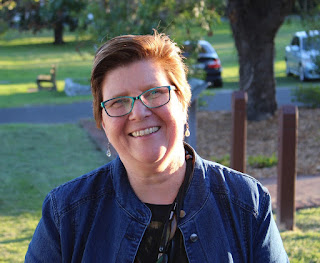Leaders Need Lindas
Linda moved away from my church several years back to start a new life on the far south coast of NSW. So, to be honest, we lost touch and though I knew of her cancer, I regret I could not walk with her through it. I have no doubt that Linda went on to make a great contribution in what would be the last chapter of her life. But her passing has given me pause to reflect on the contribution she made long before her sea-change.
Linda, a librarian by vocation, was a lover of ancient and modern thought. It was commonplace to see a freshly folded photocopy of some article or chapter from a new book materialise from the depths of her handbag with a wry smile and an air of optimism that I would be hooked by an unfamiliar idea. It was Linda who introduced me to writers like Brueggemann and Willard and McLaren, who have since shaped me profoundly. She also exuded a passion for the arts and how the imagination could awaken one’s spiritual senses. She was a gifted and creative person who stepped forward into places of leadership because she cared deeply for Jesus, the church and the future.
But truth is, we didn’t always see eye to eye. In fact, Linda left me frustrated at times and I’m pretty sure I left her the same. You see, Linda had a way of seeing life and spirituality from left field. At times that alternative perspective was painful to hear for a young, male, know-it-all like myself. But thankfully she persisted with me and did so with grace and honour. She was a strong woman yet never arrogant. Passionate but never overpowering. She would usually say what she thought, but with a gentleness couched in terms like “I wonder if….”
Leaders like me need people like her somewhere in the ecosystem of our leaderships. And I suspect that in every church across the world God has planted Lindas – people who are strong minded, wise and deep-hearted – wanting the best for their leaders and their churches. Sadly, they are often side-lined or silenced because clergy (usually male) forget that their congregation have so much more to offer than filling rosters and funding the ministry.
I read a recent article by the Washington based Brookings Institution, analysing the staff turnover within the Trump administration. In summary, the report shows that 57 of the 65 (88%) “A Team” positions in Trump's administration have turned over in his first term - some as many as 6 times. There have been 6 Deputy Directors of the NSA, 5 Communications Directors, 4 Chief of Staffs, 3 Press Secretaries …and a President in a pear tree.
Now I don’t know the circumstances of all of these resignations and sackings but I suspect that if you have double the next highest turnover rate in a Presidential administration in history, it may have something to do with the man at the top. Trump seems to remove the voice of dissent from his life, and from my limited experience, that makes you a weaker leader, not a stronger one.
Strong people need to allow other strong people to have a voice in our lives so we don’t live in the echo chamber of our own thoughts. We need people to challenge us when we think we can’t lose and encourage us when we think we can’t win. We need people to bring alternative viewpoints when we can’t see, and people to bring God's voice when we can’t hear.
King David needed a Nathan to call out his moral failure. The Apostle Peter needed a Paul to call out his hypocrisy. Moses needed a Jethro to counsel him concerning his workaholism. And Nebuchadnezzar needed a Daniel to interpret his dreams.
So, three cheers for the Lindas of our leaderships and our personal lives. And if you are the person with the most power in your organisation - build a culture of feedback around you and make sure you invite people into your life who can speak their mind and tell you what they really think. You may not always like it, but it just might be what you most need.
But truth is, we didn’t always see eye to eye. In fact, Linda left me frustrated at times and I’m pretty sure I left her the same. You see, Linda had a way of seeing life and spirituality from left field. At times that alternative perspective was painful to hear for a young, male, know-it-all like myself. But thankfully she persisted with me and did so with grace and honour. She was a strong woman yet never arrogant. Passionate but never overpowering. She would usually say what she thought, but with a gentleness couched in terms like “I wonder if….”
Leaders like me need people like her somewhere in the ecosystem of our leaderships. And I suspect that in every church across the world God has planted Lindas – people who are strong minded, wise and deep-hearted – wanting the best for their leaders and their churches. Sadly, they are often side-lined or silenced because clergy (usually male) forget that their congregation have so much more to offer than filling rosters and funding the ministry.
I read a recent article by the Washington based Brookings Institution, analysing the staff turnover within the Trump administration. In summary, the report shows that 57 of the 65 (88%) “A Team” positions in Trump's administration have turned over in his first term - some as many as 6 times. There have been 6 Deputy Directors of the NSA, 5 Communications Directors, 4 Chief of Staffs, 3 Press Secretaries …and a President in a pear tree.
Now I don’t know the circumstances of all of these resignations and sackings but I suspect that if you have double the next highest turnover rate in a Presidential administration in history, it may have something to do with the man at the top. Trump seems to remove the voice of dissent from his life, and from my limited experience, that makes you a weaker leader, not a stronger one.
Strong people need to allow other strong people to have a voice in our lives so we don’t live in the echo chamber of our own thoughts. We need people to challenge us when we think we can’t lose and encourage us when we think we can’t win. We need people to bring alternative viewpoints when we can’t see, and people to bring God's voice when we can’t hear.
King David needed a Nathan to call out his moral failure. The Apostle Peter needed a Paul to call out his hypocrisy. Moses needed a Jethro to counsel him concerning his workaholism. And Nebuchadnezzar needed a Daniel to interpret his dreams.
So, three cheers for the Lindas of our leaderships and our personal lives. And if you are the person with the most power in your organisation - build a culture of feedback around you and make sure you invite people into your life who can speak their mind and tell you what they really think. You may not always like it, but it just might be what you most need.
The way of a fool is right in his own eyes, But a wise man is he who listens to counsel.
Proverbs 12:15
Where there is no guidance the people fall, but in abundance of counsellors there is victory.
Proverbs 11:14
Wounds from a friend can be trusted, but an enemy multiplies kisses.
Proverbs 27:6
Photo Credit with thanks to Ian Campbell.













